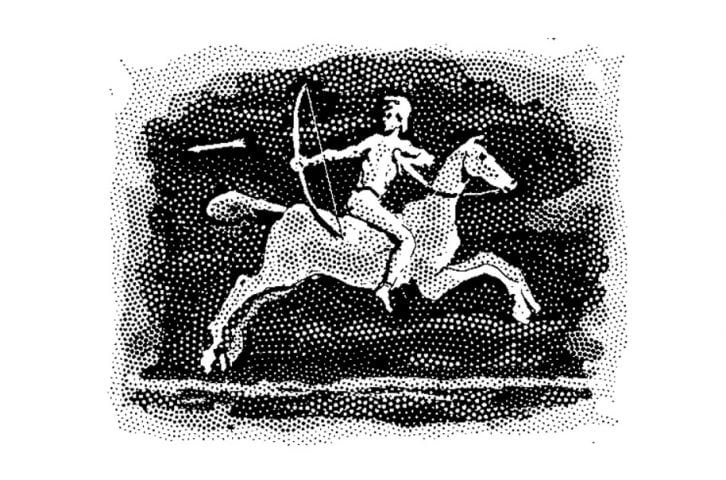Books Reviewed
A review of Aquinas and the Nicomachean Ethics, edited by Tobias Hoffmann, Jörn Müller, and Matthias Perkams.
Thomas Aquinas mentioned Aristotle repeatedly in his writings, calling him simply “the Philosopher.” In doing so, Aquinas recognized not only Aristotle’s greatness but also his importance for Thomas’s own project. Scholars frequently have questioned the extent to which Aquinas’s thought was truly Aristotelian: wasn’t theology always more important to Aquinas than philosophy? Given that Aquinas is considered by many to be the greatest Christian philosopher of all time, such claims raise important questions about the relationship between religious faith and philosophical reason.
The students of Aquinas have come full circle on this issue. In the early 20th century most Thomists considered Aristotle’s philosophy to be an essential part of Aquinas’s thought. Thomistic manuals from that time were quick to make the claim that Aquinas had “synthesized” Aristotelian philosophy and Christian theology. This consensus began to break down in the 1930s, when “neo-Thomists” such as Etienne Gilson and Jacques Maritain emphasized Aquinas’s debts to Augustine and the early Church Fathers, as opposed to Aristotle. Aquinas, they argued, wrote purely as a Christian theologian, offering no genuinely philosophic insights. In succeeding years, Thomists such as Charles De Koninck and Ralph McInerny returned to the older way of thinking about Aristotle’s indispensable role in Aquinas’s work.
This debate sharpens when it comes to competing interpretations of Aquinas’s 12 commentaries on Aristotle, particularly the Commentary on the Nicomachean Ethics. In certain parts of that commentary, Aquinas departed from the text of Aristotle to add his own arguments, inviting the reader to judge whether those new points were based on faith or reason. Over 60 years ago a young Harry V. Jaffa wrote a doctoral dissertation (directed by Leo Strauss) to do precisely that, to disentangle Thomas’s reliance on faith from his reliance on natural reason. References to the perfect happiness of Heaven, for example, simply could not have been what Aristotle had in mind when he wrote the Ethics 350 years before Christ. Therefore, Jaffa concluded in his resulting book, Thomism and Aristotelianism (1952), that Aquinas’s purpose in writing the commentary was to lure readers into thinking Aristotle’s ethical philosophy more compatible with Christian theology than it really was—to make Aristotle safe for Christianity. Views similar to Jaffa’s have been expressed by Fr. René Gauthier (the editor of the official Leonine edition of the Ethics commentary), who claimed, however, that Aquinas’s distortions of Aristotle were inadvertent, not intentional.
* * *
Recently a quite different interpretation of the Commentary on the Nicomachean Ethics has been advanced: Aquinas did not mislead, on purpose or by accident, but showed his students how his own larger philosophical arguments interlocked with Aristotle’s, extending the Philosopher’s arguments where questions were left unanswered. Jaffa himself directed a dissertation by Kenneth Kaiser along these lines in 1986, and in philosophy professor James C. Doig’s 2001 book Aquinas’s Philosophical Commentary on the Ethics: A Historical Perspective he argued for a “philosophical interpretation” of Aquinas’s Ethics commentary. In one of Doig’s examples, Aquinas makes assertions about the afterlife in a comment on Aristotle’s discussion of happiness. Jaffa and Gauthier contended that those assertions rested entirely on religious belief. But, as Doig points out, in that section of the commentary Aquinas uses phrases extremely similar to ones in his Summa Contra Gentiles, suggesting a connection. In both places he asserts: “Because the desire of nature is not in vain, it can be rightly thought that perfect beatitude is reserved to man after this life.” But in the Summa Contra Gentiles he supports his assertion with a philosophical argument for the afterlife. By looking deeper into such matters, it becomes clear that Aquinas had philosophical reasons for many points that at first glance seem based solely on faith. This way of interpreting Thomas highlights both the philosophical arguments he made and the debt he owed to Aristotle, since Aquinas often reapplied points Aristotle made in books other than the Ethics. Aquinas thus used “more Aristotle” to explore questions left unanswered by the Philosopher in the Nicomachean Ethics.
* * *
That brings us to this new volume of essays, edited by three German scholars, which is ideal for readers who wish to know what distinctively philosophical contributions Aquinas made to ethics. The contributors to Aquinas and the Nicomachean Ethics largely support an interpretation similar to Doig’s, based on research into Thomas’s reflections on happiness, prudence, justice, pleasure, incontinence, friendship, virtue in general, and specific virtues, such as courage. They also incorporate what Aquinas said about ethics in works beyond the Commentary on the Nicomachean Ethics, such as the Summa Theologica and Disputed Questions. While Doig’s goal was to be historically accurate about the purpose of one of Aquinas’s books, what these authors seek to assess is the treatment of a given philosophical topic across several of his books, and to judge whether those arguments have merit.
Twelve of the thirteen essays argue not only that Aquinas did not distort Aristotle’s text, but that he significantly improved its philosophical arguments. (The one exception, an essay on friendship and charity, judges Aquinas’s attempt to appropriate Aristotle’s notion of philia as simply unsuccessful and leaves it at that.) Each essay follows roughly the same format. Aristotle’s position on a given topic (e.g., courage) is offered, utilizing recent scholarship; the essay then puts forward Aquinas’s position on the same topic; and the author concludes by examining whether Aquinas merely appropriated Aristotle, or contributed to a deeper philosophical understanding than Aristotle himself presented. Like Doig, the authors also compare Aquinas’s commentary with the commentary on the Ethics written by his teacher Albert the Great, a work that Aquinas himself helped edit. Overall, the authors bring together many sources and insights, sorting out what had been a messy debate. The result is perhaps the best book in print on Aquinas the moral philosopher, as opposed to Aquinas the moral theologian.
* * *
Several of the essays concern the crucial topic of prudence. In the Nicomachean Ethics Aristotle claims that prudence is deliberation about the means of acting—the ends of action are given by the good or bad habits we develop based on our upbringing. For people raised by parents who allow them to behave badly, according to Aristotle, very little can be done to alter their behavior. They are pointed toward a bad end, and no amount of philosophical discussion can change that. Aquinas differs from Aristotle on this. He argues that although most of the deliberation we do concerns means, we do at least sometimes deliberate about ends. Bonnie Kent argues in her essay, “Losable Virtue,” that Aquinas’s altered view of prudence allows him to account for dramatic changes in people’s lives, for better or worse (“backsliding” as she puts it). She says Thomas’s view of virtue is “more realistic,” since he believes that a virtuous character is not simply “fixed” from the beginning. For example, Benjamin Franklin decided to leave his strict childhood home of Boston for the cosmopolitan city of Philadelphia, thereby choosing a life of entrepreneurship and adventure over the one intended by his parents—the drudgery of running the family’s printing business.
Aquinas’s adjustment to Aristotelian prudence required adding several concepts, including will and intention. Matthias Perkams argues that Aristotle did not have these precise words or concepts in his Greek. Aquinas adopted them from Christian theologians such as Augustine, but for good philosophical reasons. Another concept Aquinas ties into his scheme of prudence is his important idea of natural law. As Tobias Hoffmann explains, natural law precepts enter the picture because Aquinas considers them to be one of the ways that we know and choose ends. All of this, though absent from Aristotle’s writings, is a well-reasoned response to problems with Aristotle’s idea of prudence.
* * *
It appears there are some new things to consider about ethics since Aristotle’s time, and we have Thomas Aquinas to thank for several of those breakthroughs. Some reviewers of Aquinas and the Nicomachean Ethics have complained that it does not give Aquinas’s moral theology its due, in particular his treatment of grace and of the infused theological virtues such as faith, hope, and charity. But it seems clear that those aspects of Thomism were left out because this book was written for a different purpose—correcting misjudgments about Aquinas’s philosophical arguments. As a Catholic priest, Aquinas necessarily rejected the idea that natural virtues could secure the eternal salvation available only through Jesus Christ. All that his proof of the afterlife establishes is that some humans will experience it and that the experience will be of a contemplative character. But because grace perfects rather than destroys nature, both the natural and supernatural virtues are of worth and should be pursued.
Discovering the philosophical Aquinas also helps avoid the lazy Thomism that treats faith-based truths as though they were unassailable philosophical principles. Although they may sharply disagree with what Jaffa wrote in Thomism and Aristotelianism, contemporary Thomists should thank Jaffa for laying down objections that stirred them to begin to think through these questions. Aquinas and the Nicomachean Ethics is a splendid example of why Thomists should never be stingy in giving Aristotle credit as their Philosopher.





